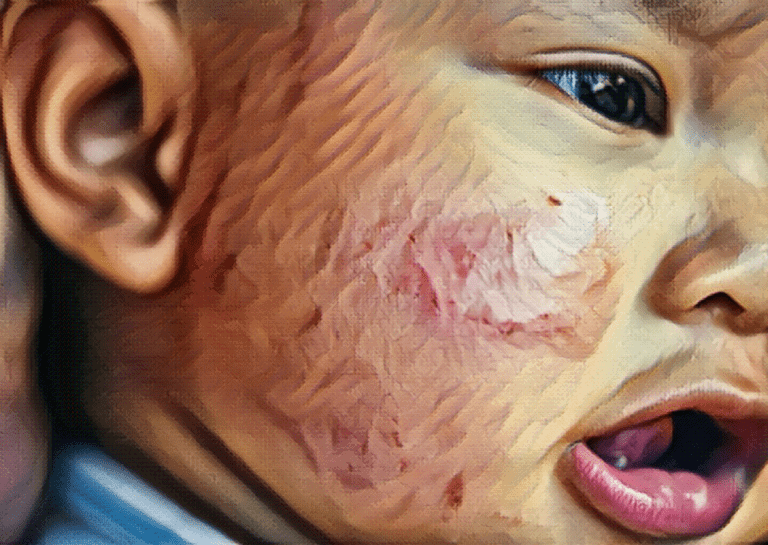Experts estimate that eczema affects at least one in ten children. It’s a chronic skin condition that can cause dryness, itchiness, and redness and can be frustrating for both children and parents. If you have a baby with sensitive skin, you may be wondering if it’s something more diagnosable, like eczema. And if your child has been diagnosed with eczema, you may be wondering what treatment looks like.
In this post, we’ll look at the full scope of symptoms that fall into an eczema diagnosis, what causes it, treatment of the skin condition, and answer the question about if it will ever go away.
Table of contents
Symptoms of eczema in a toddler
Dry and sensitive skin doesn’t necessarily mean your toddler has eczema. So, let’s look at what signs point to something more than irritated skin and to the possibility of the chronic skin condition. The medical symptom that’s always present is an itchy rash. If it’s not itchy, it’s not eczema. The average onset of eczema is around three months old but can range from one to six months. In most cases, symptoms present themselves by the age of two.
Typically, classic eczema starts on the cheeks, around the mouth, and on the scalp of young toddlers. It can sometimes spread to the rest of the face, and it’s also common for the rash to spread to the arms and legs. In older children, the rash is typically present in areas like the joint crease of the elbow or knee. Recurrent flare-ups of the rash are normal in children and people who are diagnosed with the chronic skin condition.
What causes eczema
Medically speaking, eczema is caused by problems with the skin barrier. Many children who are diagnosed with the condition don’t have enough of a protein called ‘filaggrin’ on the outer layer of their skin. Filaggrin is responsible for helping skin form a strong outer barrier between the body and the environment, keeping out bacteria, and holding in water.
The itchy rash tends to run in families, with genetics playing a role. Environmental factors are also another trigger for the itchy rash. Children with eczema also tend to experience other allergic conditions like asthma and hay fever. It’s also common for babies with eczema to have a food allergy, like to cow’s milk, but food itself doesn’t cause the condition.
Flare-ups are typically associated with eczema, meaning the rash can come and go. If your toddler experiences this, it can help to look at some of the common irritants that can trigger the rash to reduce the number of recurrent flare-ups.
Common irritants or allergens that can trigger a flare-up or make a current rash worse include:
- Soaps, like a bubble bath
- Pollens
- Animals
- Foods
- Wool
- and dry air
How to treat eczema
Thankfully, there are ways to treat eczema to ease any uncomfortable symptoms, like excessive itchiness. Keeping the skin moisturized is crucial since the skin is often dry and irritated because of the lack of filaggrin. Applying moisturizing creams or lotion a few minutes after a bath can help lock in moisture and treat any dry, irritated patches of skin. There are also steroid creams that can help control itching and inflammation.
If you or your pediatrician pinpoint any irritants that could be making the condition worse, make a plan to limit or cut out exposure to those things. If you suspect your toddler has eczema, it’s important to talk to a medical professional. Other conditions could also mimic similar symptoms, and it’s vital to get an accurate diagnosis before trying any treatment. If it is eczema, your pediatrician can work with you to create a care plan.
While eczema is chronic, it’s impossible to tell if your toddler will grow out of it or not. For some children, the condition starts to go away by the age of four. Some children will continue to have dry, sensitive skin for the rest of their lives or have to treat eczema in adulthood, as well. So far, there’s no absolute answer to which children outgrow the condition and which don’t. But it is possible that eczema won’t be something they have to deal with for the rest of their lives.
